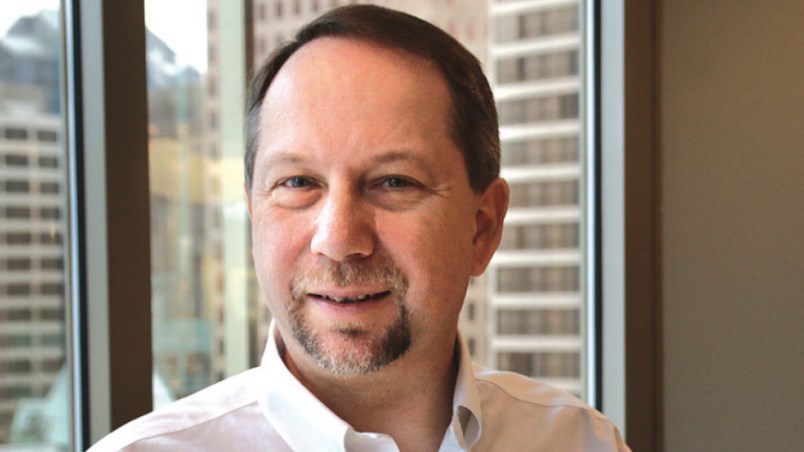Ken Armstrong wants New Westminster residents to have a say about whether B.C. should host the 2030 Winter Olympics.
Armstrong, who is the New West Progressives mayoral candidate, wants the City of New Westminster to put the issue on the ballot in the Oct. 15 civic election.
“Residents deserve to have their voices heard on this topic,” he told city council Monday. “We have a municipal election coming up this fall, and there can be no cost associated with adding a referendum question to the ballot. So I ask, will city council engage with our residents and put the question of support for the Games directly on the ballot this fall?”
Council members did not discuss Armstrong’s request, which was made during delegation period at its April 11 meeting. Staff has not yet responded to the Record’s request about costs associated with doing a referendum during the civic election.
On Tuesday, a Vancouver city councillor failed to get a seconder for a motion calling for a public vote on hosting the 2030 Olympics. Other council members have voiced concerns that a public vote is contrary to a memorandum of understanding between the four First Nations, Vancouver and Whistler.
A non-profit group called Vancouver 2030 is exploring the viability of bringing the 2030 Winter Games back to Southwest British Columbia and is working to generate publicity and to develop the relationships necessary to facilitate a successful games bid.
“As we know the 2010 Vancouver Winter Olympic and Paralympic Games brought legacy infrastructure to host communities of Vancouver, Richmond and Whistler, such as the Richmond Oval, the Hillcrest Community Centre and significant improvements to BC Place Stadium,” Armstrong told council. “Smaller communities in our region, such as New Westminster, did not see any meaningful benefit. In fact, some may argue that disproportionate infrastructure investments were diverted to host communities at the expense of New Westminster and other Metro Vancouver communities.”
Following the meeting, Armstrong told the Record he is personally undecided about a 2030 bid to have the Winter Olympics in southwestern British Columbia, but he thinks New West residents should have an opportunity to tell city hall whether they think the city should participate if the Olympics return to the region.
According to Armstrong, New Westminster has seen a 16% population growth in the last 10 years and 11% growth in the past five years, but the city has the same number of community centres and hockey rinks and one fewer swimming pool than it did 10 years ago. If southwestern B.C. hosts another winter Olympics, he said there may be opportunities for New Westminster to leverage new infrastructure.
“For instance, we may be able to host events or practice facilities, which could direct federal and provincial infrastructure spending to New Westminster, which could result in upgrades to our hockey arenas or curling club,” he said in a statement to the Record. “I also believe there will be a wide variety of opportunities for our hospitality sector to get involved with any future Games, and I am confident there will be increased opportunities for our hospitality sector with the increased tourism associated with any Games.”
In December 2021, the four host First Nations (Lilwat, Musqueam, Squamish and Tsleil-Waututh) and the City of Vancouver and Resort Municipality of Whistler signed a memorandum of understanding that states this would be an Indigenous-led bid. That MOU marked the beginning of a process to assess the feasibility of hosting an Olympic and Paralympic Games.
“It’s tremendous that the 2030 bid will be indigenous-led, and it’s about time the four host nations were included at the leadership level in a project like this. Events of this magnitude must have meaningful engagement with indigenous peoples,” Armstrong said in an email to the Record. “Our proposal is about city hall and city council doing what they are supposed to do: listening to the residents of New Westminster, like we are doing with our online survey and our town halls. That includes listening to and engaging with the Halkomelem-speaking Peoples upon whose traditional and unceded lands New Westminster is situated.”
City clerk Jacque Killawee said Section 83 of the Community Charter allows for council to “seek community opinion on a question the council believes affects the municipality, by voting or any other process the council considers appropriate.”
“Costs involved in would include: determining the question, printing the question on the ballots, advertising the question broadly in the community, advertising for scrutineers, and staff time in swearing-in scrutineers (a minimum of two per voting place – one in favour, one against,” she said in an email to the Record. “A similar section in the Vancouver Charter allowed the City of Vancouver to conduct a plebiscite for the 2010 Olympics (outside the municipal election cycle), at a cost of approximately $600,000 (2003 dollars). The result of seeking community opinion is non-binding.”
According to Killawee, the city could place a question regarding the 2030 Olympics on the ballot. She said such a question would need to be approved by council no later than its July 11 meeting.



